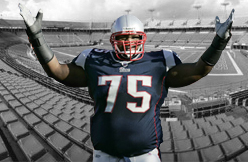In most contract negotiations, there are key checkpoints that shape the course of future talks. The Patriots and Vince Wilfork will officially reach one Thursday when the two-week window in which NFL teams can assign the franchise tag to players begins.
Wilfork, who went on the offensive a few weeks ago, said it would be a slap in the face to be tagged as it would limit his ability to fully experience the open free-agent market. Still, barring a contract extension before Feb. 25, he surely realizes that it will be coming.
As harsh as it may seem to someone who seemingly did everything asked of him and has played out his entire six-year contract, the business-minded Patriots aren't about to let their best defensive lineman get away.
The only way the situation can be fairly analyzed is to know the parameters that each side is taking, and that's the big unanswered question. Public perception seems to be that the Patriots are holding a hard line and aren't even negotiating, but it's hard to believe that is the case.
The key, of course, is in the details of any offers.
That's where this picture gets a bit cloudy, because the Patriots aren't going the Atlanta Thrashers route and publicly talking about a contract proposal to a player, a la Ilya Kovalchuk. The next time they did that would be the first, although if they feel they have a fair offer that is being rejected, it might be something they would consider to appease part of their fan base that seems to be growing frustrated with losing top players and not seeing the same level of talent replace them.
Say, for example, the Patriots were offering Wilfork a long-term deal at $8 million to $9 million per season and it was being turned down. Wouldn't that place a different context on the way the situation was viewed?
With Thursday's checkpoint set to arrive, here is a quick recap on the key points of the Wilfork contract situation:
Six-year deal doesn't sit well. As a rookie in 2004, Wilfork signed a six-year contract with the Patriots. The NFL later made six-year contracts illegal and that seems to be at the root of Wilfork's displeasure, contributing to his insistence for a long-term deal as if he were on the open market. "We never asked for a six-year deal from the get-go," Wilfork said on sports radio WEEI in the days leading up to this year's Pro Bowl. "I didn't like the six-year deal but I did honor it. ... We tried for a five-year deal and we didn't get [it]."
Talks have been ongoing since 2009. With the pace of negotiations not to his liking, Wilfork skipped the team's voluntary minicamp last spring to show his displeasure. Yet when it came time for the Patriots' mandatory minicamp and training camp, Wilfork showed up and explained it wasn't in his DNA to hold out. That was the opposite approach of Richard Seymour, Deion Branch and Asante Samuel, all of whom either received a long-term deal or earned some type of concession from the team (e.g. no franchise tag). That might also be contributing to Wilfork's current stance -- he did the right thing by showing up and yet it was players who didn't who received what they wanted, not him.
Uncertain labor forecast a factor. Owner Robert Kraft said during the season that the Patriots wanted to be flexible in a situation where they didn't know what the rules would be, and that might have contributed to the inability to strike a big-money extension with Wilfork. Now those rules are becoming clearer. NFL commissioner Roger Goodell recently said a 2010 season without a salary cap is a "virtual certainty" as owners and the players' association are far apart in negotiations on a new collective bargaining agreement. In theory, that should help accelerate talks with Wilfork and that's why it wouldn't be out of the question that momentum can build toward a deal.
Patriots draft Ron Brace in second round. With Wilfork entering the last year of his contract in 2009, the Patriots drafted his potential replacement by tabbing Ron Brace of Boston College in the second round (40th overall). Brace played only about 50 snaps all season and there remains a question if he will develop into a full-time player. Brace's slow start has seemingly strengthened Wilfork's leverage.
Franchise tag details. The franchise tag is the average of the top five salaries at the position on a one-year deal. For Wilfork in 2010, it would be $7 million. While it's a nice one-year payout, it doesn't provide the long-term security that players often covet, and shifts the risk to the player's side to make it through another season healthy.
Wilfork draws decisive battle lines. In the days leading up to the Pro Bowl, Wilfork capitalized on his league-wide platform by letting it be known it would be a dream come true to play for a Florida-based team. While he said his first priority was to return to the Patriots, he made it clear that he was no longer adopting a "Mr. Nice Guy" approach with them. "I'm not sitting by the phone waiting for them to call," Wilfork said on sports radio WEEI. "...I want a long-term deal or I want to be free. Point blank."
Click here to order Vince Wilfork's proCane Rookie Card.

(espn.com)



